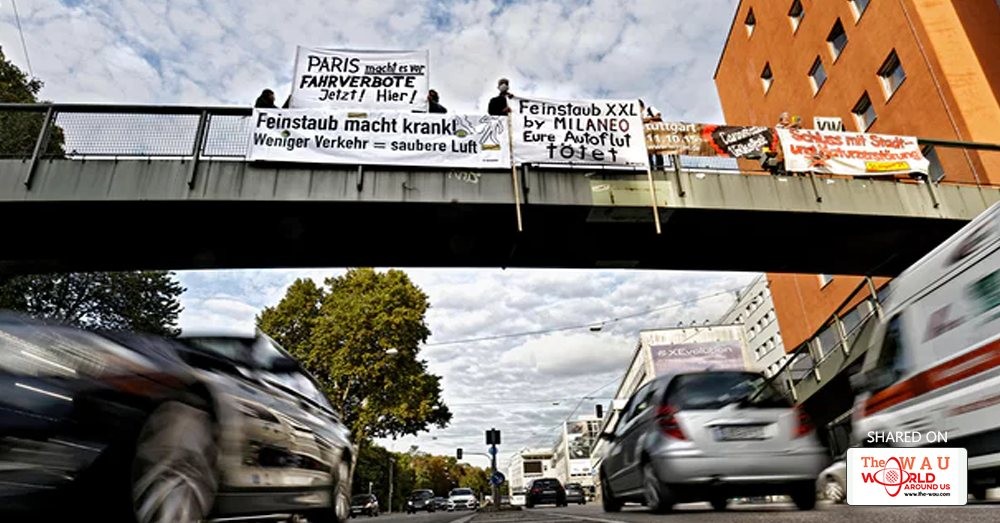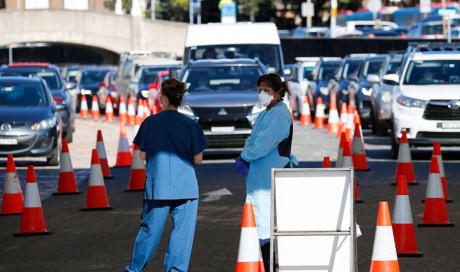For the three young Porsche technicians joshing around in their tea break outside one of the carmaker’s assembly lines in Stuttgart, life seemed good last week. Like all the company’s 20,000 employees, they had just been given a bonus of €9,100 (£7,735); sales and profits were soaring; Porsche was investing €1bn in new models; and, in the sparkling southern German spring sunshine, their future as skilled craftsmen looked secure, well rewarded and full of promise.
“I am optimistic. We make the best cars and we have a good employer,” said one man. “I am young, but I have bought a house and next year I hope to buy a Porsche.”
But elsewhere the mood in Stuttgart, the car capital of Europe where the automobile was born in 1886 and where Porsche, Mercedes-Benz, Bosch and many major auto suppliers have their HQs, is far from confident. All the social, technological and political trends point to a rapid demise of the polluting internal combustion engine, the coming of electric cars and the end to German car dominance.
In the wake of “Dieselgate”, when VW was found to have cheated emission figures, and the arrival on the car scene of digital companies such as Uber, Tesla and Google, all jockeying to introduce driverless and electric cars, the sedate German industry is waking up to the fact that it may be left behind by the US and China and that if it does nothing its cars could soon seem like antisocial relics.
“The industry is at a crossroads. German car companies have had their heads in the sand. They cannot compete with companies like Tesla, or with China, which will determine the future markets for the car. The Chinese market is 23 million cars a year. In Germany it is 3-4 million,” says Christian Hochfeld, director of Berlin-based transport thinktank Agora.
Because Germany sells its cars largely to China, the knock-on effects of what happens there will be huge, he says. “The plan by the Chinese to clean up pollution in their cities by introducing more and more electric cars will drive the global market. They are starting to build cars around batteries and are getting better and better. In a few years, Chinese cities will have quotas for electric cars, progressively closing down the market for petrol or diesels.”
Climate change, too, will force carmakers to go all-electric or, like Toyota, to use hydrogen. “After the Paris climate agreement in 2015 we know that industry has to be decarbonised to meet carbon targets. Either it does something very serious or it will never meet its targets,” he says.
With one in three of all industrial workers in Stuttgart in the car industry, the unions see the coming decarbonised world as dangerous. An internal combustion engine has about 1,200 parts, an electric motor only 200, suggesting far fewer workers will be needed, says Frederic Speidel, head of strategy at IG Metall, Germany’s biggest union with more than 500,000 car workers.
But rather than resist the coming revolution, Speidel wants the companies to build more environmentally friendly cars and embrace the new electric, digitised auto world. “China is developing whole cities to develop only batteries. The battery will be 40% of the whole value of the car in the future world. Air pollution is dangerous,” he says. “Dieselgate was the industry’s Chernobyl and it has to do something. The classic internal combustion engine will sooner or later disappear.
“The old world is still dominant in Germany but carmakers here are in a very difficult position,” he says. “There is not the demand for the electric car yet, but there is the political necessity. We expect the EU to tighten new emission levels by the end of the year.”
Porsche plans to spend €1bn on an all-electric model, the Mission E, to be on the road by next year. Its vision, says Otmar Bitsche, director of e-mobility, is for one in four of its cars to be all-electric by 2025. On current output, that would mean about 60,000 electric cars a year.
“We think it is possible to sell 20,000 a year in Europe by the end of 2020,” he says. “We are not late getting into the market, but we had to wait for battery technology to improve.”
But Germany lags behind some European countries in the electric car stakes. Norway, with just 5 million people, has more than 100,000, the UK has more than 35,000 registered but Germany, with 80 million people, has only 25,000.
That will change fast, say industry watchers. EU carbon standards, which demand a fleet average of 95g CO2 per km by 2021 and much lower by 2025, will force carmakers to build and sell electric vehicles in large numbers, say analysts.
“What started with plug-ins and hybrids is moving quickly to fully electric and driverless cars,” says a spokesperson for Magna, one the world’s biggest car-parts firms, which supplies Ford and others. It expects hydrogen cars to be a long-term goal.
“Electrification is coming fast. I think one in three of all cars will be hybrids, plugins or full electric by 2030,” says Claus Huisgen, director of global marketing at Getrag, part of the Magna group and the world’s largest supplier of transmission systems. “We are definitely in a transition to the electric car. It is being driven by global trends like urbanisation, by CO2 emissions and by China. Electric is the only way to meet CO2 targets.
“I cannot see the end of the internal combustion engine globally, but the direction is clear. It may be phased out in some regions, like Europe and in mega-cities. China is requiring more and more pure electric cars and hybrids. The train has left the station but the timetable isn’t clear. This is a period of great change.”
But Stuttgart has an immediate car problem. Surrounded by the steep hills of the Neckar valley, it is plagued by congestion, the worst air pollution in Germany and the construction of one of Europe’s biggest infrastructure projects, a €6bn railway station.
“The electric car cannot come fast enough to Stuttgart,” said Katja Kruszynski, part of Bl Neckartor, a citizens’ group taking the state to court for pollution breaches. “Cars dominate this city. It has 600,000 people and about 300,000 cars. This is the heart of the car world,” she says. Last week, as nearly 900,000 cars a day drove through and into the city on four-lane motorways, the Green party mayor, Fritz Kuhn, issued another “feinstaubalarm”, or “fine particulate alert”. But powerless for the moment to restrict traffic, fine drivers or stop anyone burning wood, there was little evidence of anyone leaving their cars at home .
Kuhn, a Green mayor in a car capital, is in a difficult position. He might be expected to crack down on car culture but in Stuttgart he must steer carefully. “We need to reduce the number of cars. But it’s a battle to be ecologically sound. It’s OK for cities like Copenhagen [to ban cars] but they don’t have a car industry. They don’t have powerful car companies.
“The industry here does not know where it wants to go. It says, ‘You cannot ban the diesel’ and economically that is understandable. The head of Mercedes tells me he needs the profits from diesel to have the money to invest in low-carbon cars. But if the industry wants to sell in China it will have to make environmentally friendly cars.”
The free-market opposition FDP party is horrified that, from January, it will be possible for the city to fine about 60,000 highly polluting cars from coming into certain parts of the city on “fine dust” days. Stuttgart broke EU pollution levels on 69 days last year, but there should be no restrictions on drivers, said Hans-Ulrich Rülke, chairman of the FDP group in the state parliament.
“I have been hearing all this talk of electric cars for 20 years. It’s always around the corner. Only 7% of all polluting emissions in Stuttgart come from the exhausts of cars and the problem is mostly dust, from brakes and construction. We reject the idea of diesel restrictions. We have to ensure health, but also the health of the economy. We don’t think banning diesels or any car is the way,” he said.
City planner Wolfgang Forderer, charged with improving transport in Stuttgart, despairs of the car culture but has found money for more bike lanes, electric cars, walking routes, better information about pollution and charging points. “This is the beating heart of the world car industry. The reality is it is very hard to do anything against the car lobby. They are well organised. We are 100% over the pollution limits but persuading people not to use their cars is hard,” he said.
“We must change the way we think about cars. We need alternatives. The whole city of Stuttgart is a bottleneck and we have become completely car-oriented. The car people here say it is only a small part of the problem but it’s not. The internal combustion engine is absolutely the problem.”
Share This Post















